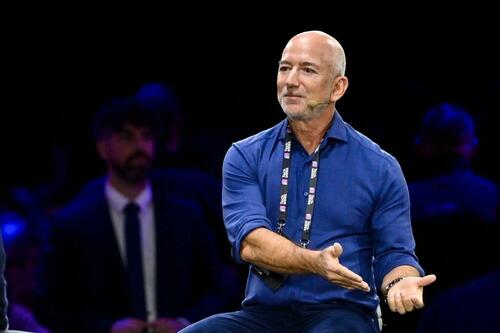In a jaw-dropping vision of the future, Amazon founder and executive chair Jeff Bezos predicted Friday that “gigawatt-scale” data centers will be built in space within the next 10 to 20 years, powered by endless solar energy - and that they’ll eventually outperform their Earth-bound counterparts.

Speaking at Italian Tech Week in Turin, Bezos said orbital computing will be the next great leap forward, likening the rise of artificial intelligence to the early internet boom — full of hype, bubbles, and inevitable winners.
“These giant training clusters, those will be better built in space, because we have solar power there, 24/7. There are no clouds and no rain, no weather,” Bezos said in a public conversation with Ferrari and Stellantis Chairman John Elkann. “We will be able to beat the cost of terrestrial data centers in space in the next couple of decades.”
Bezos framed the shift as part of humanity’s ongoing migration to space infrastructure.
“It already has happened with weather satellites. It has already happened with communication satellites. The next step is going to be data centers and then other kinds of manufacturing,” he said.
Space Servers: Big Gains, Big Headaches
The concept of orbital data centers has gained traction among tech giants as Earth-based facilities devour electricity and water to cool their racks of servers. Continuous sunlight and zero weather make space an appealing option - at least in theory.
But Bezos acknowledged there are serious hurdles ahead: maintenance and upgrades would be far more difficult in orbit, rocket launches are costly, and any failure could wipe out billions in hardware in a flash.
Still, the Amazon founder insists that as launch costs fall and technology improves, the economics will eventually tilt in space’s favor.
Bezos also turned to artificial intelligence, calling it a transformative force that should be embraced despite the frenzy surrounding it. He drew direct parallels between the AI surge and the dot-com era, when hype led to a crash — but also paved the way for the modern digital economy.
“We should be extremely optimistic that the societal and beneficial consequences of AI, like we had with the internet 25 years ago, are for real and there to stay,” he said. “It is important to decorrelate the potential bubbles and their bursting consequences that might or might not happen from the actual reality.”
Bezos added that while AI investment might look like a bubble, it’s the good kind - an industrial bubble that drives progress rather than financial destruction.
“This is kind of an industrial bubble as opposed to financial bubbles. The ones that are industrial are not nearly as bad - they can even be good. Society benefits from those inventions,” he said, adding "Investors don’t usually give a team of six people a couple billion dollars with no product, and that’s happening today."
Loading recommendations...